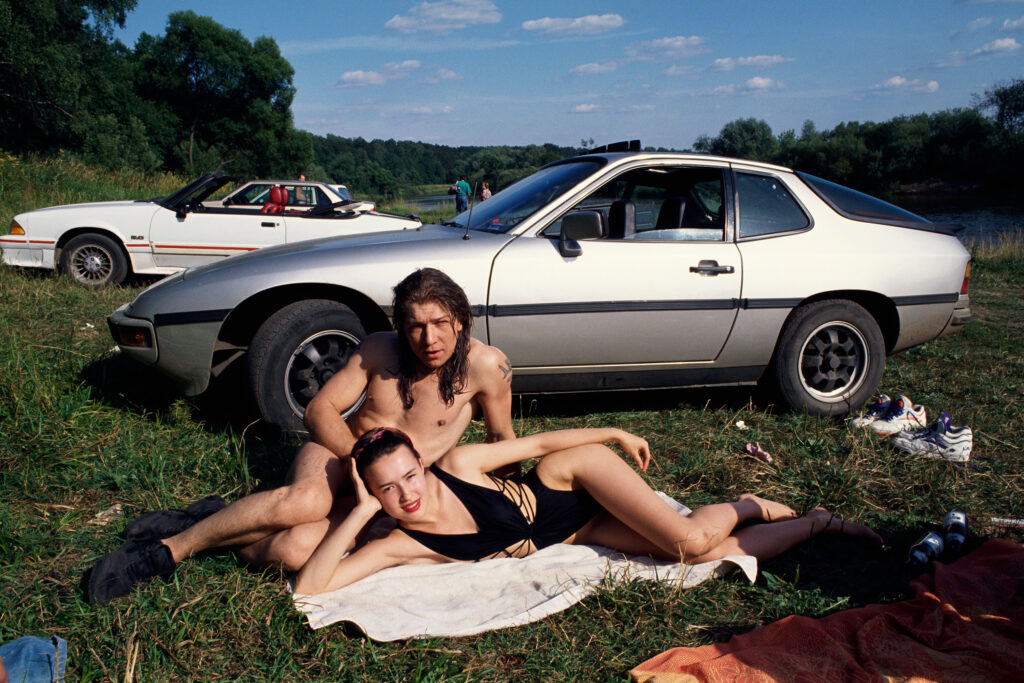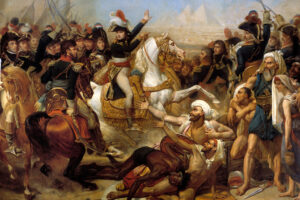Certainty and Strange Thoughts

Something very fundamental is happening in world history, again. If anyone had been hoping that the Western alliance’s rallying together after Russia’s invasion of Ukraine in 2022 or the scattered (and at times self-contradictory) efforts of the Biden administration to shore up international law would be enough to save the so-called liberal international order, the first few months of the second Trump administration should be enough to dispel that notion. The three pillars of liberal internationalism—multilateralism, democracy, and free trade—have already taken severe hits and more are likely to come. At the very least, this moment marks the end of the post–Cold War order.
Almost as striking as the speed with which things are getting dismantled is the fact that no one—academics, policymakers, journalists, social media influencers, podcasters—seems to have a clear idea about what comes next. Talk of crisis and disorder abounds; some analogies to the 19th and 20th centuries pop up here and there, with comparisons to imperial competition and lessons from the interwar period or predictions about a Cold War 2.0. But this is all very backward-looking, all very muddled. Contrast the present with the end of the Cold War. Those who were around for that last world-historical moment will remember that there was no shortage of projections about the future then, some optimistic, some pessimistic—which is to say, too, that there is no greater proof that liberalism’s current crisis is real than the establishment’s inability today to imagine anything about what will follow.
In 1989, I was a child in Istanbul. By the time I was in college in the United States a decade later, a few early post–Cold War visions had already gained quasi-canonical status and were guiding debates in introductory political science classes. Among the most popular were Francis Fukuyama’s essay ”The End of History?” published in The National Interest in 1989; Samuel Huntington’s “The Clash of Civilizations?” published in Foreign Affairs in 1993; and Robert Kaplan’s “The Coming Anarchy,” published in The Atlantic in 1994. Much has been said about these arguments—especially the first two—in the intervening years, a lot of it quite critical: Both “The End of History?” and “The Clash of Civilizations?” have more than 50,000 citations in Google Scholar. The essays were then expanded into books.
Certainly, Fukuyama, Huntington, and Kaplan got a lot wrong and oversimplified things, and they deserved much of the criticism that came their way. When I first encountered their essays as a teenager from Turkey studying in the U.S., they angered me, too: Whatever the apparent disagreements among them, they all reeked of an unquestioned assumption about U.S. or Western superiority and put forward judgments ranging from dismissive to sensationalist about the rest of the world. Rereading these texts three decades later, however, I find myself feeling more generous toward them.
From the vantage point of 2025, I am more interested in their relative clarity about the future (the question marks in the titles notwithstanding). If you consider the range of the authors’ professional backgrounds—policy (Fukuyama), academia (Huntington), and journalism (Kaplan)—their forward-looking orientation seems even more remarkable, especially in contrast to our present confusion: Not even the wonks shied away then from bold projections. What does that say about how our moment compares to the immediate aftermath of 1989?
Fukuyama opens “The End of History?” by noting, “it is very hard to avoid the feeling that something very fundamental has happened in world history.” The essay was based on a talk he had given at the University of Chicago, but Fukuyama himself was not in the academy at the time, having worked for a decade at the RAND corporation and in 1989 for Policy Planning at the State Department. By the second paragraph Fukuyama declares the moment “an unabashed victory of economic and political liberalism.” For him, the 20th century has completed a circle: It “began full of self-confidence in the ultimate triumph of Western liberal democracy,” and now it was closing in the same manner, after a century-long detour into ideological violence. (Note, though, that he never considers the contradiction he creates for himself here: If the West had been wrongly confident a century before, why think it was correct this time?) By the fourth paragraph of the essay, his now-famous thesis appears in full: “What we may be witnessing is not just the end of the Cold War, or the passing of a particular period of postwar history, but the end of history as such: that is, the end point of mankind’s ideological evolution and the universalization of Western liberal democracy as the final form of human government.” However triumphalist this may sound, the essay ends with a note of melancholy: “The end of history will be a very sad time.” In a world devoid of ideological struggles, there will be neither art nor philosophy. In fact, humans may get so bored that they will start history again, Fukuyama predicts (or perhaps hopes).
When “The Clash of Civilizations?” was published in 1993, Huntington had already had a long and distinguished academic career as a professor of government at Harvard University. Huntington starts off agreeing with Fukuyama that the age of ideological conflict is over, but then he argues that this does not mean conflict is over altogether. According to him, from the Peace of Westphalia in 1648 until the end of the 20th century, all conflicts “between princes, nation states and ideologies” had been “primarily conflicts within Western civilization.” Now, international politics were moving out of the Western phase.
Huntington was rightly taken to task for his almost cartoonishly essentialist and inconsistent discussions of civilizations in this essay: “Western, Confucian, Japanese, Islamic, Hindu, Slavic-Orthodox, Latin American and possibly African civilization.” But he also observed—and this is often overlooked—that “the peoples of governments of non-Western civilization no longer remain the objects of history”; they now “join the West as movers and shapers of history.” And just as Fukuyama tempered triumphalism with sadness, Huntington moderated his prediction that civilizations would collide by calling on them to learn to coexist and find commonality.
Kaplan’s “Coming Anarchy?” is not as well known as either Fukuyama’s or Huntington’s essays, but I think it belongs among them, as it, too, offers a sharp vision of the 21st century, sometimes much bleaker than the others. Back in 1996, the historian Paul Kennedy argued, “it is difficult to think of an article which more disturbed policymakers’ minds in recent years… Perhaps Samuel Huntington’s provocative Foreign Affairs essay… is closest.” Kaplan, who had made a name for himself as a war reporter and foreign correspondent, argues that environmental and demographic stress in West Africa is the symbol of things to come to all of Africa, perhaps the world: “To understand the events of the next fifty years, then, one must understand environmental scarcity, cultural and racial clash, geographic destiny, and the transformation of war.” He predicts that cities will be transformed by mass migration from the countryside. The redrawing of borders. The use of technology in war for “primitive ends,” as he puts it, referring to tribal conflict. This is not an uplifting picture. Of these three post–Cold War visions, it is Kaplan’s that takes the environmental and material challenges of the future most seriously—and it did so at a time when climate change was not yet part of mainstream discourse. The U.S. was ignoring Africa at its peril, Kaplan concluded, even as he seemed resigned that Washington’s influence was waning and predicted a future of isolationism for the U.S.
Each of these essays seems to have forecast the ethos of each of the three decades that followed the Cold War: Fukuyama and the 1990s, marked as those were by the optimistic expansion of the liberal international order; Huntington and the 2000s, with 9/11, the War on Terror, and the confrontation between the West and Islamic fundamentalism; and Kaplan and the 2010s, and the increasing anxiety around demographic and environmental threats such as migration and climate change.
Fukuyama may have been wrong to announce the end of history then, but he was right that liberalism was the last standing ideology of the 20th century. In fact, future historians may wind up talking about a long 20th century and mark its ending around now, in 2025, as liberalism really is being abandoned (it will just have taken longer to die than competing 20th-century ideologies). Huntington may have been reductionist, borderline insulting, in his characterizations of other civilizations, but at least he recognized before many others that the time of non-Westerners was coming. And Kaplan was correct that some of the biggest threats in the 21st century would have to do with the environment—even if he was sensationalistic of his coverage of West Africa and complacent in his predictions about North America.
Perhaps I am more kindly inclined toward these prophets of the 1990s and their prognostications now because I am living through yet another world-historical moment as an adult. And because this one is poised to be even more transformative than 1989: It actually is the bookend to 1945. But why then do I do not see any visions today about what is to come next, in the way that there were in the early 1990s?
Perhaps the moment actually hasn’t quite arrived. Constant chattering about the crisis of the liberal international order has preoccupied the Western academy and policy circles for the better part of the last decade, but those discussions have still assumed that this order could be salvaged somehow. Or, at the very least, that its demise would be relatively gradual. (These beliefs, I think, were shared by both Western and non-Western observers of the international order.) But what if whatever remained of the 20th-century order has now been more or less dynamited by the Trump administration? Might new visions of the future start to emerge? This seems unlikely, especially in the West. Fukuyama’s, Huntington’s, and Kaplan’s visions were grounded in their confidence that things in the U.S. and the West were basically fine—which is also why they could speculate about the rest of the world with varying degrees of gloom. To the extent that they imagined future problems (ranging from very few, in the case of Fukuyama, to very many, in the case of Kaplan), the threats came from outside of the West, and these authors’ big-picture projections about the future involved how the West would deal with them. But now the Western intelligentsia is finding out what much of the rest of the world has known for a long time: It is very difficult to be forward looking and develop grand visions when everyday matters and basic politics can no longer be taken for granted.
Perhaps, too, the real opinionmakers of our time are not to be found in universities or government bureaucracies, but on social media, blogs, and podcasts. The blogger Curtis Yarvin has argued for “Caesarism,” i.e. “authoritarian one-man rule partially legitimized by necessity;” the entrepreneur Balaji Srinivasan has called on tech leaders to seize cities and exclude non-techies. Such fringe theories now have the attention of the mainstream, no doubt, and they do seem (overly) confident, but I do not think they qualify as visions of the future. They are just familiar justifications for exploitative political behavior from which Western publics were spared for much of the last century. Only, in times of crisis, it is clear arguments, not caveats and nostalgia, that sell.
Or maybe we have lost our nerve today and feel too small in the face of the current polycrisis. The early 1990s were an uncertain time as well, but uncertainty of thought was not the problem. Today, though, we no longer seem to believe in our own agency—and yet to imagine a future one must have some degree of self-belief. This observation is all the more depressing because lacking a vision of the future only compounds the challenges we face in the present. The West in the 1990s may have had too much belief in itself, but that problem has been overcorrected.
“The End of History?” has this throwaway line: “For our purposes, it matters very little what strange thoughts occur to people in Albania or Burkina Faso, for we are interested in what one could in some sense call the common ideological heritage of mankind.” The sentence has stuck in my mind since I revisited Fukuyama’s essay to write this one: I think we are entering an era in which it is hard to speak of a common ideological heritage, and so it will matter very much what “strange thoughts” occur to people in places we used to dismiss. Do not expect the next world order to be built by the architects of the previous one. Unlike in 1989, the rest of the world today has the edge partly because it is more used to thinking against a backdrop of uncertainty than the West and therefore faces less of a crisis of confidence.
During uncertain times, I find my work in the longue durée of history comforting. It shows that although history is not linearly progressive (things do not always improve), new visions of order emerge from periods of crisis and disorder (but sometimes this takes a long time). And often they emerge from unexpected places.
Ayşe Zarakol is a professor of international relations at the University of Cambridge, where she also has an appointment as a politics fellow at Emmanuel College. Her books include After Defeat: How the East Learned to Live with the West (2011) and Before the West: The Rise and Fall of Eastern World Orders (2022).


